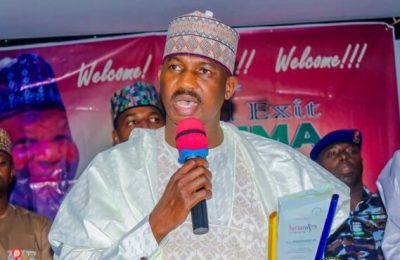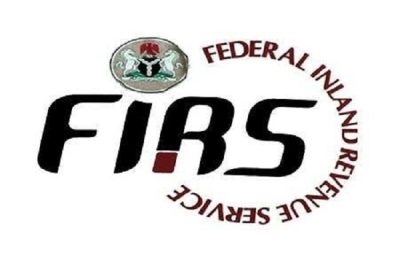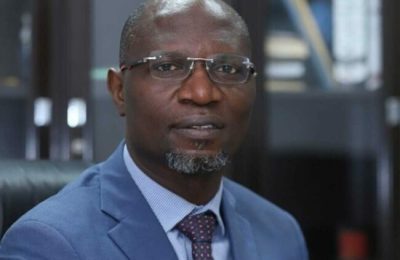
Sindy Foster is the Principal Managing Partner of Avaero Capital Partners, an aviation consultancy firm helping to create a better pipeline to investment for aviation businesses in Africa. In this interview with SHOLA ADEKOLA, she spoke on burning industry issues ranging from lack of proper data record, aircraft maintenance facilities (MRO) and other. Excerpts.
WHAT is your view about MRO sector in Nigeria?

My biggest issue with the MRO sector in Nigeria is an issue I have across the board with the aviation sector. Lack of credible data, lack of quantifiable information with which you can plan. So a lot of these discussions are anecdotal. They’re based on individual experience or on knowledge gleaned through conversations on groups. They are not structured, informed ideas. And that’s my biggest problem, which is the biggest explanation for why the industry in Nigeria across the board has stalled.
Let me just give you a little bit of more context with regards to my background, because most of you here know me because of my involvement with Avaero Capital Partners. But my involvement in the aviation aerospace sector goes back to 22 years, way before Avaero. I started my aerospace and aviation career in the UK, working with a marketing and PR agency, of which I was a director and co-founder,which was working with aerospace service providers. Casco Aero, one of the AOG companies in the UK, CNC lathing equipment and testing and machining companies who provide equipment for automation testing of Rolls-Royce engines. We also worked with a number of instruments and companies and suppliers to the OEMs.
So I’ve been in and around the aerospace engineering side of the industry far longer than I have been involved at the airline end of the business. And what I can tell you from the UK and the American experience I have had is that decisions aren’t made based on anecdotal evidence or anecdotal opinion. It’s based on data gathering, Research is based on cross agency, information grabbing and sharing.
And so without that as a basic foundation, we’re going nowhere in Nigeria. So before you can talk about profitability and financial stability or sustainability, we need to get into what business model do we have in terms of, MRO operations in Nigeria. There are many private sector companies who are wanting to enter the market. There are a few within, but it is all unplanned development. It is not strategically formed in terms of the type of business, who their customers are, what aircraft they are going to be servicing, and that will determine the personnel that they’re going to need and the tooling they need and the financing that they need.
There is not one aviation market. There are multiples of aviation market in the UK. We’ve got a close alliance between aerospace and defense.
So you’ve got MROs which are covering civil aviation. You’ve got some which are covering business aviation. You’ve got those which are purely focused on airlines, so in-house MROs.You have also got those who are MRO hubs, whether it is regional or whether it is providing for global businesses. We are yet to decide what we’re trying to achieve in Nigeria, but we are doing it. When you haven’t decided what you are trying to do, you cannot now create any sort of plan or model. You can not have any kind of understanding of what the funding or space requirement or skill requirement is going to be. So I think that we are so much at the beginning of this conversation before we even get to the point of profitability and sustainability.
What are the primary economic and financial challenges that aircraft maintenance operations face in Nigeria and what are the solution?
I think it is very much an endemic issue. Scale is a problem across the board in aviation in Nigeria. We have seen it on the airline side where we have two aircraft and they want to fly to eight destinations and in the same way. You have got an environment where you have got MROs, which in other countries, the size of our MROs would be considered mom-and-pop workshops, not fully-fledged MROs, but those MROs want to take on the work, they want to take on every aircraft type. They have not defined themselves in terms of what they are going to do, which aircraft they are going to tool for. There is an idea that if you exist in the market, you want to be a monopoly and try and do everything. You cannot be everything to every person.
You have not only got restrictions when it comes to the finance for tooling.
A little operation cannot attract the finances that they need to be able to do a very good job. So it means that airlines are looking elsewhere to fulfill their needs, particularly when the local ones are not able to deliver on time because they are trying to do so many things, so many different aircraft type with the same number of people. So you have got to cut your coat according to your cloth And so you’ve got those restrictions.
But deciding what business model you’re going to do is an issue, one of the things I wanted to come back at, the elephant in the room has not been addressed here.
A few months ago, we heard that the minister of aviation thought it would be a good thing to have MROs at every airport in Nigeria. As if that is feasible. The government needs to stop inserting themselves in commercial decisions. The private businesses need to do feasibilities in terms of the models that they are trying to do. It’s not for the government to dictate what type of MRO they are going to have.
In other countries, and I have to keep coming back to examples from other countries because we don’t have adequate examples in Nigeria, and so even when you’re looking at what is the infrastructure gap in terms of numbers for Nigeria, you have to rely on Africa data because we don’t know the figures for Nigeria.
Let me give you an example, Delta Airline strategically chose to buy older aircraft to make it achievable and affordable and financially feasible for them. They created a very solid MRO business. That is one of the technologically advanced businesses on a scale as Amazon in terms of warehousing and parts, cataloging, so that automation is predicting which aircraft is going to need which part and where that part needs to now be stripped to.
If you’ve ever seen the Delta operation, you will see the future of aviation when done properly. It’s like they’re using machining when in Nigeria, they’ll be using 20,000 people And so that keeps the cost low. It keeps accuracy high And they know where every single part is, so there is a huge gap in terms of what the airlines are able to do in Nigeria because of scale. Without scale, you can’t attract the financing to be able to do the things that you need to do. If you don’t have scale, Should you be trying to be all things to everybody? That is a strategic business decision that businesses need to make. The businesses within Nigeria are scared to make decisions that look like they are retreating rather than progressing. But sometimes the way to win the war is not to go after every battle, but to be selective in terms of what you’re going to find. And we certainly don’t need the ministry, who know nothing about commercial realities in the world, going out and trying to attract MROs of any kind of description from wherever they are. I’ve seen some business models for Nigerian aviation.
A company approached me. They had a fantastic business plan, fully scoped out all the data, paid for and accessed and available. They came to Nigeria. And they were asked to give money as a bribe before they were introduced to anybody that had any kind of authority to do anything. These are the reasons why we are where we are. So, you know, as much as I’m happy to talk about profitability and sustainability, I’m going to name the elephant in the room.
Looking at the Nigerian environment, the MROs in Nigeria, how can the MROs be sustainable in terms of a growing concern, I mean, in the business? How can they also be able to practice green?Environmental practices, looking at the environment and all of that.
How can that happen within the MRO environment in Nigeria?
Okay, let’s start with the business side. And let me turn this around and ask you a question. If you are a potential investor in an MRO business, you’ve heard that there’s this opportunity for growth in Nigeria, there’s a rising population, there’s a rising propensity for people to travel, and you think, I’m going to jump on the back of this and I’m going to put my money into an MRO in Nigeria, then you hear the government’s plans.So, on one hand, the government are saying they want there to be MROs, because MROs are fundamental for the sustainability of the airline business model. Otherwise, we wouldn’t have all these grounded aircraft. But at the same time, you are going to kill off private sector investment because you’re now planning for there to be MROs like McDonald’s in every state. So, it’s not an incentive to attract investment. when you make statements that are not backed by any feasibility study, by any data, you actually are more likely to ensure no business sustainability in the future because in order for those MROs that currently exist to be able to grow, they need to be able to attract investment.
They need to be able to get more land and who are the people who are giving the land? The Government , So, the government. They are not likely to give land to private sector MROs to expand. Without expansion, they’re going to die. We’re not going to attract private sector MRO when there is a sword of Damocles hanging over the MRO sector because at any minute now, the government may give off the MRO opportunity in Nigeria exclusively to one new venture partnership, which they have done or tried to do before.
I don’t know if you remember, we’ve already assigned MRO to Egypt Air, you know, during the former minister, HadiSirika days. So, this government policy on MRO, which keeps coming up, has already been assigned to one set of parties. At least it was published that it was going to Egypt Air, Egypt Air apparently knew nothing about it, but there you go. So on one hand, you’ve got to be careful what messages you are putting out there in terms of how that’s going to be received by the private sector.
It would make sense for those who have an interest in MRO within Nigeria, maybe look at creating a mega MRO, which encompasses multiple investors that will then be able to grow the number of aircraft that they are servicing, not just domestically, but also regionally in order you need to be able to create a plan in order to have that sustainability.
Now, one of the other elements that we are missing is domesticated spare parts. So in the UK, I’ve been on aircraft which have gone tech whilst i’m on the aircraft then i’ve seen my client casco aero coming along the taxiway coming down and parking up and then replacing whatever part within 25 minutes the aircraft is now going can that happen in Nigeria you know Im just down the road from me there is an MRO with an aircraft storage facility and a parts of workshop and they will actually break down aircraft and they will refurbish the parts and they will sell them and so we don’t have an ecosystem to support the aviation industry within Nigeria and so all we do is when an aircraft has reached the end of service in whichever way it’s just left there, to be cannibalised and just a a bad mark on the landscape of the airports around Nigeria and these aircraft would have had some value just like the aircraft down the road which are shipped in from all over the world into a little storage facility just down the road from where i live and these airlines are able to realise the value of the aircraft right until the end of service or some of the aircraft and they get overhauled and whatever and they get moved into cargo.
We don’t have any MRO that has got that kind of ability to break down aircraft and distribute the parts across Africa. We need that. If we’re going to be looking at climate sustainability and environmental sustainability, we need to reduce the importation of equipment that we could recirculate, refurbish and recirculate within the African continent, even on a regional basis.
So when it comes to carbon, I think, yes, there is a global need to reduce carbon footprints. But I think that that cannot be our focus within Africa. We are on the receiving end of the climate change. So there is definitely work that needs to be done, but not at the expense of the industry.
I think that just as before the West realized that carbon mitigation strategies in terms of planting trees and carbon capture weren’t necessarily the answer to the whole equation. But they went down that route for many years before they decided that. So there’s time for Africa to plant some more trees and, you know, do some climate mitigation strategies before it allows itself to stop, creating an environment for prosperity within Africa by banning diesel, you know, by forcing all the airlines to move to SAF, fuel and all of this kind of stuff. There’s time for that.
And so, you know, environmental sustainability is a huge thing.I think before we come to environmental sustainability, we should be looking at governance as well, because, you know, economic sustainability and governance (ESG) is the thing we want to focus on sustainability. But the economics and the governance are equally important, particularly if you are in an environment that cannot support the funding of all your infrastructure development through local funding.
So if you’re requiring external funding to come in, you need to take seriously ESG, economic sustainability and governance.
What are the advice to Nigerian business concerns desiring to venture into manufacturing of tools in Nigeria?
I did allude to the fact that when i said that we need to domesticate some of the foundational supplies that are required to have an aviation industry. So we need things like proper so when an airline has got an aircraft which they are not using for whatever reason instead of that aircraft being left in the open it needs to be put in a proper storage facility climate controlled storage facility so that the equipment doesn’t degrade.
If we are ever to see growth in MROs in Nigeria, we need MROs and aviation industry to be outside of this political interference, political appointments, which change on a regular basis and then have new strategies, new directions adopted. It’s stop and go, stop and go, stop and go. No industry in the world, particularly the aviation, which has a long-term focus, can survive or grow with that mindset. So somehow, I don’t know how, we need to see a new version of the aviation sector because MROs are not in isolation. So what happens with the airlines impacts the MROs, unless the MROs in Nigeria are going to be beneficiaries of SAATM, But typically, we are a consumer and not the driver.







